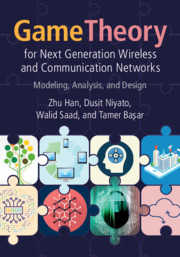Book contents
- Endorsements
- Frontmatter
- Dedication
- Contents
- Acknowledgements
- 1 Introduction
- Part I Theory
- Part II Applications
- 9 Applications of Game Theory in the Internet of Things
- 10 Applications of Game Theory in Network Virtualization
- 11 Applications of Game Theory in Cloud Networking
- 12 Applications of Game Theory in Context-Aware Networks and Mobile Services
- 13 Applications of Game Theory for Green Communication Networks
- 14 4G, 5G, and Beyond
- 15 Security
- References
- Index
12 - Applications of Game Theory in Context-Aware Networks and Mobile Services
from Part II - Applications
Published online by Cambridge University Press: 13 June 2019
- Endorsements
- Frontmatter
- Dedication
- Contents
- Acknowledgements
- 1 Introduction
- Part I Theory
- Part II Applications
- 9 Applications of Game Theory in the Internet of Things
- 10 Applications of Game Theory in Network Virtualization
- 11 Applications of Game Theory in Cloud Networking
- 12 Applications of Game Theory in Context-Aware Networks and Mobile Services
- 13 Applications of Game Theory for Green Communication Networks
- 14 4G, 5G, and Beyond
- 15 Security
- References
- Index
Summary
This chapter presents two applications of game theory in context-aware wireless networks and mobile services. The first application is regarding the game modeling of sponsored content of mobile services. In the sponsored content concept, content providers can sponsor the subscribers of a service provider, i.e., a mobile network operator, to access contents or services from the content providers with discounted prices. The context of users in terms of network effects, which is the influence of one user to other users, is an important factor affecting the decisions for service access. The game theoretic model that captures this factor is presented. The second application is on content caching for social networks. In the caching environment, content centers and cache centers are two types of players. The content centers look for cache centers that maximize the content delivery performance. Likewise, the cache centers seek for content centers that provide the best benefit. The matching game is formulated to address this issue.
Keywords
Information
- Type
- Chapter
- Information
- Game Theory for Next Generation Wireless and Communication NetworksModeling, Analysis, and Design, pp. 315 - 346Publisher: Cambridge University PressPrint publication year: 2019
